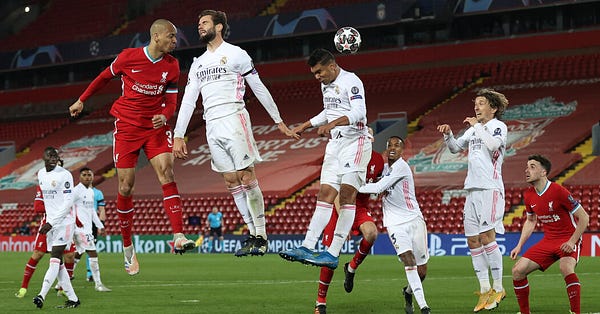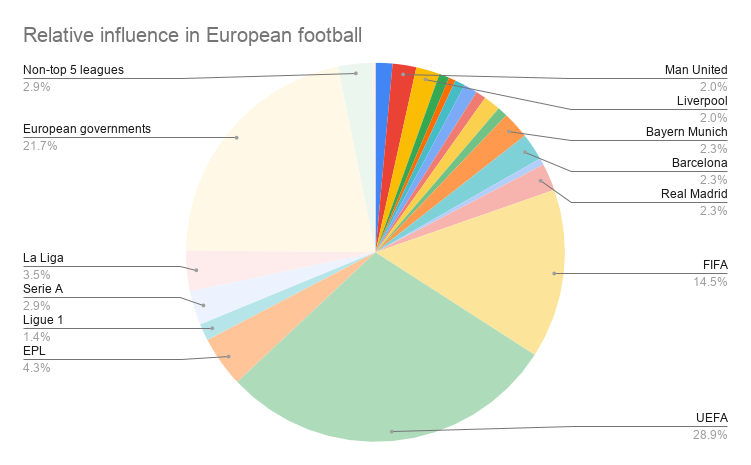I predict the European Super League won't happen
Using political modeling on the future of soccer
Yesterday, news broke that some of the biggest clubs in European soccer are planning a closed breakaway league. It’s a move worth billions for the teams involved at the expense of everyone else and quickly drew reaction from prime minister, soccer administrators, and fans across the world.
Besides the money at stake, here’s why its struck so deep a nerve around the world, from Jonathan Liew in the Guardian:
At the heart of this move, then, is a distaste for the basic point of sport itself: a battle of nations and cultures, towns and regions, ideas and systems, an ecosystem with a top and a middle and a bottom, something you go out and play as well as sit down and pay for. Perhaps this had long been an unfashionable idea at the sharp end of the game.
But in stating their intention to establish a closed competition – or a largely closed competition, which in effect would be largely the same thing – the biggest clubs have laid out their vision for the future of football: a 12-month reality television show whose sole purpose is to generate a ceaseless stream of content, animus and talking points.
Modeling what’s to come
However, this newsletter is not to give my opinion on the idea of the league (though if you want it, it’s an atrocious money-grab that would be deeply damaging to the sport).
Instead, I wanted to see what the Influence Bargaining model thought about what the outcome of this battle for billions will be.
The Influence Bargaining model was developed to forecast the likely result of multifaceted political negotiations in which parties have differing levels of interest and power in a situation. A continent-wide dispute over resources between power-hungry executives running their own fiefdoms seems pretty close to how a lot of political disputes happen, so I thought I’d give it a try.
I won’t go through the whole methodology (if you’d like to know more about that, it’s taught in the Two Lanterns Political Risk Academy). Here are the predictions.
The Super League won’t happen…
To be more precise, the result of all of this negotiation will be an expanded Champions League (the current European competition) with a slightly less equal distribution of money.
The model forecasts that move will extract some minor concessions from UEFA for more money for the top teams. On the whole, though, the gambit will fail and the “Super League” won’t happen.
… because the teams don’t have enough power…
A key part of the Influence Bargaining Model is assigning relative levels of influence in a system to each actor. This is a trickier step for European soccer than for politics. There’s a clear understanding in Washington that the president is more powerful than a senator who’s more powerful than a representative. But is Manchester United more powerful than UEFA or its own government. That’s less clear.
However, I was able to put together a guesstimate at the distribution of power.
As you can see, the biggest teams collectively have about 20% of the influence in the system. That’s less than UEFA or their own governments. Even the biggest teams individually have less influence than their own domestic leagues. This may not be exactly correct (as will be discussed further down), but it seems roughly accurate.
UEFA could ban all players on teams involved in the breakaway league from playing for their national teams in European competition. Each league could kick the breakaway teams out and cost them their current primary source of revenue. Some teams, like Manchester City, play in publicly owned stadiums and those governments could (in theory) kick them out.
Whether they would do these steps is another question, but the fact is that they could. No longer would a breakaway league be an easy step to more money: it would be a difficult cost-benefit decision that could backfire on the clubs.
… and this is existential to everyone else.
The biggest takeaway from the model is that, while teams like Tottenham and Atletico Madrid currently think joining the breakaway league is in their interest, it’s not the top priority right now. Tottenham need to find a new manager; Atletico want to win La Liga.
For UEFA, not losing their most lucrative competition is the absolute priority. For the English Premier League, not being turned into a second-tier competition is the absolute priority. And for the rest of the teams and leagues across Europe, not being locked out permanently of a closed European competition is an extremely high priority.
Therefore, the model predicts that the most powerful actors in the negotiations to come will be UEFA and the English Premier League, because they are willing to take all steps necessary to prevent this league from happening. Banning players, points deductions, fines, suspending TV payments - all will be on the table. We are already seeing the beginnings of that.


In that context, facing certain and rising costs to join a Super League that could outweigh the uncertain benefits, the models predicts that the initiative will fail as teams pull out of it.
What we don’t know
However, there are some caveats to attach.
This model relies on information about the system we’re studying. Ideally, this model would be run on a system we have time to study or know well. European soccer, especially at the executive level, is one of the most opaque worlds we have. While we can build in uncertainty, I chose not to do so here because I wanted the model’s single best guess at the likely outcome.
The model also assumes some level of rationality among the actors. That may not be true for these executives. As the penalties rise from UEFA, it may be that stubbornness, arrogance, and sheer human folly from the people behind the project don’t let them back down. We could see a breakaway league happen even as it’s clear that’s no longer in anyone’s interest.
Why use a model
The news of this development broke early Sunday morning and was immediately followed by press releases, leaks, takes, opinions, and rants. Those are all important pieces of information, but they tend to overwhelm objective analysis. The immediate aftermath of an event is often the worst time to accurately assess their long-term result, because emotions are at their highest and context is at its lowest.
The model - even if imperfect here and full of uncertainty - helps bring us back to a recognition of the wider system at play and who is still able to make moves. I don’t think that a Super League will happen (I would give it a 70% probability), but I certainly expect that the battle over it will be long and difficult.
If you’d like to know more about the Influence Bargaining model, sign up for the Two Lanterns Political Risk Academy.




@Chris Oates Welp, that was fast (heh): https://www.axios.com/european-super-league-soccer-collapses-08229777-2160-48e0-921a-d0daae560c62.html ("How the European Super League collapsed in spectacular fashion") (4/21/2021).
"Plans for a European Super League fell apart on Tuesday, just two days after the proposed soccer competition was announced."
You were right (as I expected)!